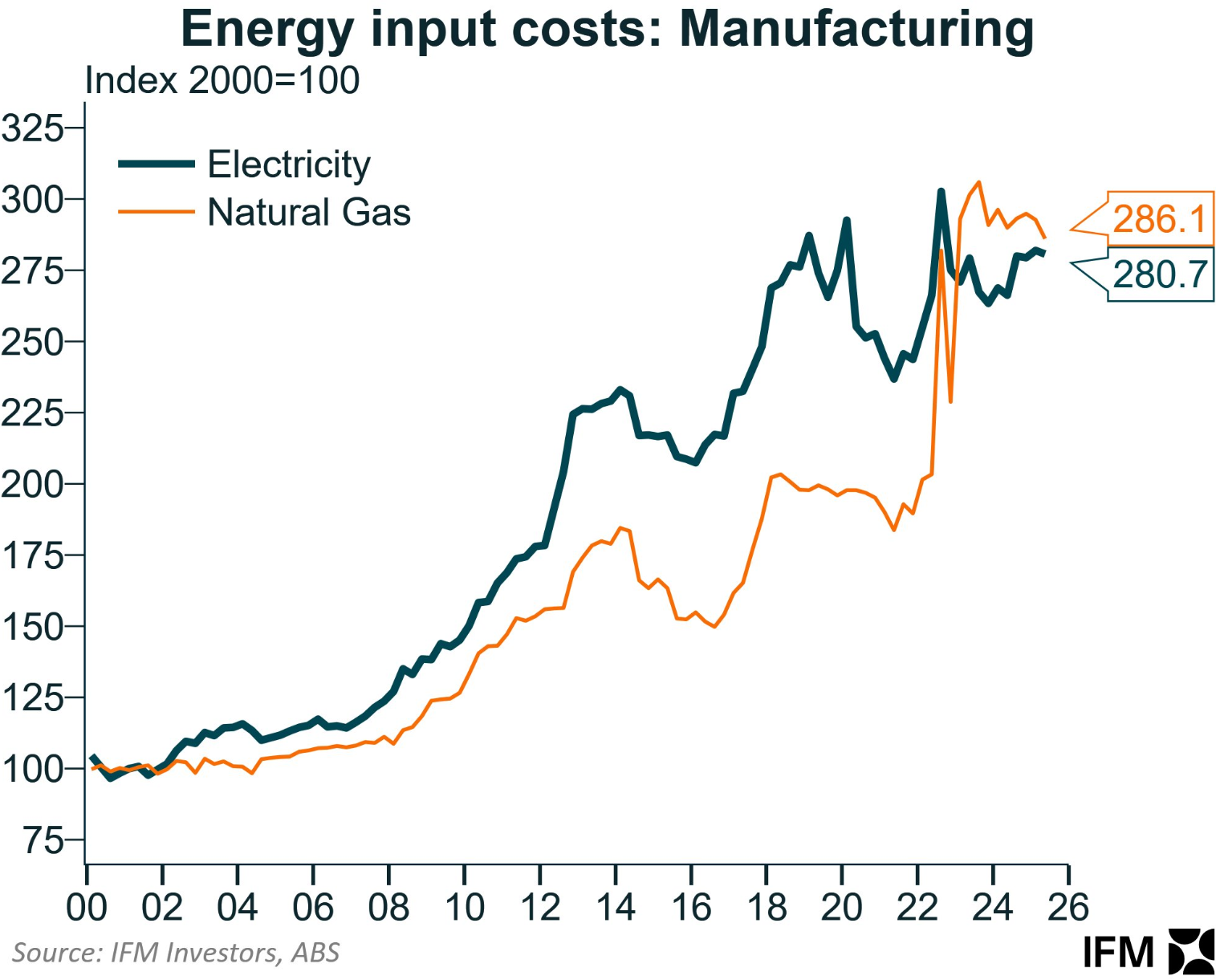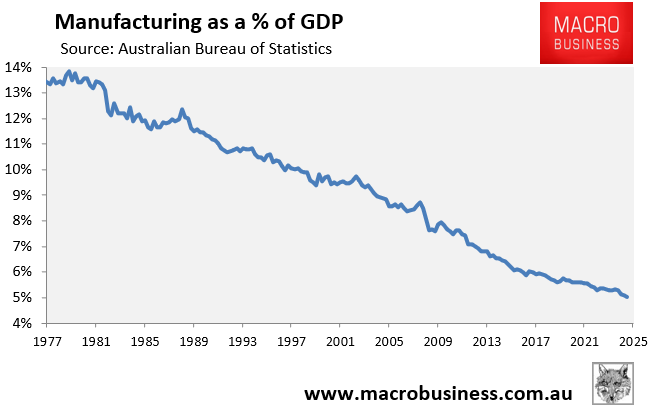Energy is the bedrock of a modern economy. Without affordable and reliable energy, an economy will experience cost inflation across the supply chain. The energy-intensive manufacturing sector will also shrink as it can no longer break a profit and compete against cheaper imports.
Australia’s economy has experienced soaring energy costs—both electricity and gas prices—which are impacting all businesses, but manufacturing the most.

As a result, Australia’s manufacturing share of the economy plunged to a record low of 5.0% of GDP in the June quarter of 2025.

ASIC insolvency statistics revealed that over 1400 manufacturers nationally have collapsed since 2022-23.
Among these, Incitec Pivot, a major fertiliser producer, closed its Australian facilities due to increased energy expenses.
Qenos, Australia’s last major plastics producer, closed in 2024 due to excessive energy costs, leaving the country completely reliant on polymers imported from China.
Oceania Glass, Australia’s sole architectural glass maker, closed in February 2025 after 169 years of operations due to rising energy prices and Chinese dumping.
Orica, the world’s largest manufacturer of mining explosives, chemicals, and agricultural fertilisers, and BlueScope Steel have threatened to close their Australian facilities and relocate to the United States in response to rising energy prices.
Meanwhile, Australia’s deindustrialisation has seen its economic complexity collapse. The latest Harvard University index of economic complexity ranked Australia a lowly 105th out of 145 nations, down from 70th place in 1998. Australia’s economic complexity is now ranked behind Botswana.
“Compared to a decade prior, Australia’s economy has become less complex, worsening 6 positions in the ECI ranking”, Harvard noted.
“Australia is less complex than expected for its income level. As a result, its economy is projected to grow slowly”.
“The Growth Lab’s 2033 Growth Projections foresee growth in Australia of 1.0% annually over the coming decade, ranking in the bottom half of countries globally”, Harvard said.
The reality is that without affordable and reliable gas and electricity, Australia’s manufacturing industry will continue to shrink, the country will deindustrialise, and it will become less diversified.
With this depressing background in mind, a new survey of 526 companies by software accounting firm MYOB ranked soaring energy prices as the top concern for Australia’s business leaders.
“The research signals rising energy costs are the most significant challenge facing Australia’s mid-sized businesses today”, MYOB chief executive Paul Robson said.
The concerns over energy costs were felt most in manufacturing, transport and warehousing, wholesale trades, recreational services, and with companies that have between 200 and 500 employees. Victoria and NSW were the states where energy costs were of the highest concern, while Western Australia recorded the lowest levels.
“They talk about energy costs but they never add in all the other energy-related charges that are going up, such as transmission and environmental charges”, managing director of metals component manufacturer Abeck Group, Peter Angelico, told The Australian.
“Just look at the last four years—I don’t know where they get the idea that costs are going to come down. I am concerned that this will keep going up, and that makes me uncompetitive with the importers”, he said.
“The reality is … Australia has electricity costs that are two to three times higher than countries that we are competing with and 50 to 100 per cent higher than the US”, BHP chief executive Mike Henry said.
East Coast Australia’s failure to implement a domestic gas reservation scheme is a major driver of rising energy prices. So too is the dogged pursuit of ‘net zero’ and the closure of baseload coal facilities in favour of expensive intermittent renewables and storage.
While all Australians will bear the consequences of our energy policy failings, the energy-dependent manufacturing sector will suffer the most.
Australia will become an even greater industrial wasteland, with a less diverse and complex economy, poorer productivity, and ultimately lower living standards.
I discussed these issues in detail in an interview with Jeremy Cordeaux on The Court of Public Opinion.

